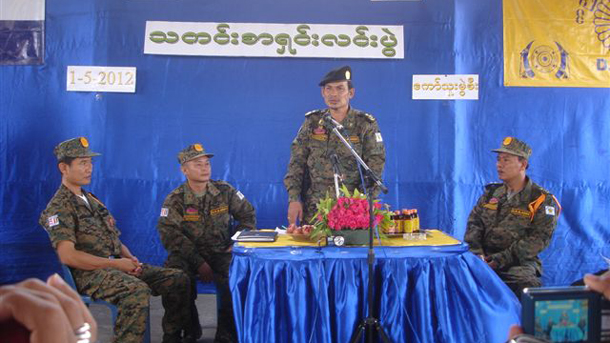Col Therdsak Ngam-sanong, a spokesperson for Thailand’s Third Army, told The Bangkok Post on the weekend that his force has no information about Democratic Karen Buddhist Army (DKBA) leader Maj-Gen Saw Lah Pwe’s alleged involvement in the drug trade.
Saw Lah Pwe, who is also known as Na Kham Mwe, was listed last month by Thailand’s Office of Narcotics Control Board as one of its most-wanted criminals for his alleged involvement in the drug trade. A reward of 1 million baht (US $32,000) was also offered for information leading to his arrest.
Therdsak told the newspaper that the arrest warrant against Saw Lah Pwe was probably based on old information related to an anti-narcotics campaign several years ago.
“The number of seized drugs in each operation is a few thousand. The western border is unlikely to be a drug production base. It is more a trafficking route,” Therdsak was quoted by the paper as saying.
Therdsak said that the DKBA’s main earnings are from land development and mining concession taxes.
Immediately after he was named one of Thailand’s most wanted on April 20, Saw Lah Pwe said he was willing to face charges in a court of law if Thai Deputy Prime Minister Chalerm Yubamrung, who accused him of involvement in drug trafficking, could offer any evidence to support the claims.
The DKBA commander also called on international anti-narcotics bodies, including the US Drug Enforcement Administration, to investigate Thailand’s allegations against him, after earlier inviting Thai and Burmese authorities to visit areas under his control in southern Karen State.
After closing 12 border crossings under his control for two weeks in retaliation for Thailand’s decision to issue a warrant for his arrest, the DKBA leader reopened them last weekend, returning border trade between Burma and Thailand to normal.
However, security around Saw Lah Pwe remains high since Chalerm announced that Thailand has asked the Burmese authorities to extradite him.
Nine years ago, a haul of drugs was seized in Thailand’s Tak Province, just across the border from DKBA-controlled Myawaddy. At that time there were reliable reports that these drugs belonged to Saw Lah Pwe, said Chalerm.

















